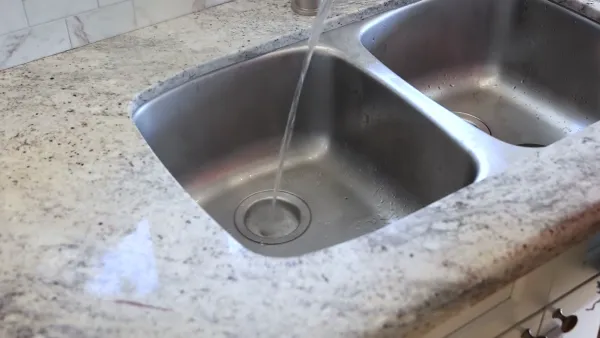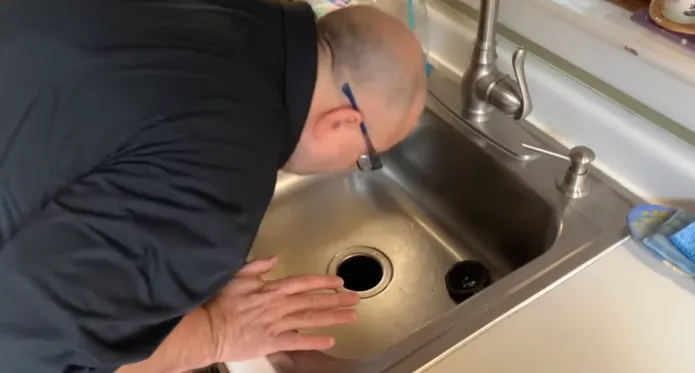Last Updated on November 14, 2023
Kitchen odors, especially those associated with the sink, resist your daily cleaning activities. You might wonder why your sink smells like fish even though you didn’t cook any. This common issue can be caused by various factors like food residue, stagnant water, or even your local water supply.
It might be due to the presence of barium or cadmium metals in your water, which can react with other substances and produce a fishy odor. Another possible cause is the use of chloramine in your local water supply. Also, algae blooms’ growth can contribute to a fishy smell in your sink.
However, there are simple steps to eliminate these fishy kitchen sink smells. We will discuss all the possible causes of this issue and provide a step-by-step guide on eliminating the odor for good. So keep reading.
Why Does My Kitchen Sink Smell Like Fish: Some Possible Causes

The cause of the unpleasant smell emanating from your kitchen sink may be hard to identify, but there are several possible explanations.
- Barium or cadmium metals
- Chloramine
- Algae blooms
- Local water supply
- Food residue
- Stagnant water
1. Barium or Cadmium metals
You might occasionally experience a fishy smell in your kitchen sink if traces of barium or cadmium metals are present. These two elements can emit a distinct fishy odor when they come into contact with water.
Barium is commonly found in certain types of industrial waste and can leach into the water supply. Cadmium, on the other hand, is often present in fertilizers and can make its way into the water system through runoff from agricultural fields.
To address this issue, identify the source of the contamination and take appropriate measures to remove or mitigate it. This may involve testing the water supply, replacing plumbing pipes, or installing water filtration systems.
2. Chloramine
If chloramine is present, you may also notice a fishy smell in your kitchen sink. Chloramine is a compound formed when chlorine and ammonia are combined to disinfect public water sources.
While it effectively kills harmful bacteria, chloramine can produce an unpleasant odor resembling fish. This odor can be particularly noticeable in your kitchen sink due to the presence of organic matter and bacteria that can react with chloramine.
Try flushing out your sink with hot water and vinegar or using a chlorine-removing filter to address this issue.
3. Algae Blooms
Algae blooms can contribute to the fishy smell in your kitchen sink during the summertime, so you should be aware of this potential cause. These algae are tiny aquatic plants that thrive in warm water and sunlight.
When conditions are right, they reproduce rapidly, forming dense colonies known as blooms. These blooms can occur in lakes and water reservoirs, and the algae blooms can enter your home through the water supply.
When you turn on your kitchen sink, the water containing algae particles can release a distinct fishy odor. Although not harmful to humans, the smell can be unpleasant.
4. Local Water Supply
Sometimes, the local water supply is responsible for the quality and smell of the water from your kitchen sink. Several factors can contribute to the smell of your tap water, such as the presence of certain minerals, chemicals, or even bacteria.
If you’re concerned about the quality of your water, it’s recommended to contact your local water supplier to address the issue. They can provide information on any ongoing maintenance or treatment processes that may affect your water’s odor.
5. Food Residue
A possible reason for the fish smell could be the food residue left behind in the drain or disposal. When you wash dishes or prepare food, small particles of food can easily get washed down the drain.
Over time, these particles can accumulate and decompose, resulting in a foul odor reminiscent of fish. This is especially true for fish dishes, as the strong odor of fish can linger if not properly cleaned from the sink or dishes.
It’s important to regularly clean your sink and disposal by flushing it with hot water and a mixture of baking soda and vinegar.
6. Stagnant Water
Stagnant water is water sitting in your sink’s trap or drain for an extended period without flowing or being replaced. If left unattended, stagnant water in your kitchen sink can lead to foul odors and bacteria growth.
This stagnant water provides an ideal environment for bacteria to thrive and multiply, resulting in unpleasant smells that can resemble the odor of fish. The bacteria in stagnant water release sulfur compounds that contribute to the fishy smell.
To prevent this issue, regularly run hot water in sinks that aren’t frequently used. This will help flush out the stagnant water and replace it with fresh, flowing water, reducing the chances of foul odors and bacteria growth.
How to Get Rid of Fishy Kitchen Sink Smells?

There are simple steps you can take to eliminate it.
STEP 1. Remove Any Leftover Food
Grab a paper towel or a scraper and eliminate any leftover food from the sink. This is the first step in removing the fishy smell from your kitchen sink. Leftover food can accumulate in the sink, leading to unpleasant odors. By removing any food particles, you can reduce the source of the smell.
STEP 2. Hot Water Flush
To eliminate the fishy smell from your kitchen sink, simply run hot water down the sink for a few minutes. The hot water dissolves these substances, allowing them to be washed away down the drain.
STEP 3. Sprinkle Baking Soda Over the Sink
Now sprinkle a generous amount of baking soda over your sink to help neutralize the fishy smell. After sprinkling the baking soda, allow it to sit for about 15 minutes. During this time, the baking soda will work by absorbing the odors and freshening up your sink.
STEP 4. Pour Vinegar to the Sink
After 15 minutes, mix a quarter cup of white vinegar with two cups of water and bring it to a boil in a pan on your stove. Let the mixture simmer for a few minutes, allowing the vinegar to permeate the air and eliminate any lingering odors.
STEP 5. Flush Boiling Water
After pouring vinegar down the drain, flush the sink with boiling water to ensure a thorough cleaning. The high temperature of the boiling water helps to kill any bacteria or mold that may be present. Repeat this step until the water runs clear and the fishy odor is eliminated.
STEP 6. Throw some Citrus Peels
To freshen up your kitchen sink and eliminate the fishy smell, go ahead and toss those citrus peels down the drain. Citrus peels like lemon, lime, or orange have a pleasant smell and can help mask odors. It’s a simple, natural solution that can make your kitchen smell fresh and clean.
Can I pour bleach down the kitchen sink drain to remove the fishy smell?
You shouldn’t pour bleach down your kitchen sink drain to eliminate the fishy smell. While bleach is a strong disinfectant and can eliminate odors, it isn’t recommended for use in your sink. Bleach is highly corrosive and can damage drain pipes, leading to leaks and costly repairs.
Also, pouring bleach down the drain can create harmful fumes and may contaminate the water supply. Instead, there are safer and more effective methods to eliminate fishy smells. You can use natural remedies like baking soda and vinegar, which can neutralize odors without causing any harm to your pipes.
Remove the Fishy Odor From Your Kitchen Sink With Simple Solutions
A fishy smell from your kitchen sink can be unpleasant and embarrassing, especially if you have guests over. If you’re experiencing a fishy smell in your kitchen sink, there are a few possible reasons, such as trapped food debris, a clogged drain, or even a malfunctioning garbage disposal.
To eliminate the odor, you can use vinegar and hot water to flush out the drain or pour bleach down the sink drain. However, you should exercise caution when using bleach and follow safety guidelines. Maintaining a clean and odor-free kitchen sink is essential for a pleasant cooking experience.

